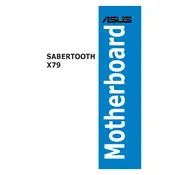ASUS SABERTOOTH X79 User Manual


To update the BIOS, download the latest BIOS update from the ASUS support website. Save the file to a USB drive, reboot your computer, and enter the BIOS setup by pressing the 'Del' key during boot. Go to the 'Tool' menu, select 'ASUS EZ Flash Utility', and follow the prompts to update the BIOS using the file on the USB drive.
First, ensure all hardware components are properly connected and seated. Check the power supply connections and test with a different power supply if possible. Clear the CMOS by removing the battery for a few minutes and then reinstalling it. If the issue persists, try booting with minimal hardware to isolate the problem.
Enter the BIOS setup by pressing 'Del' during startup. Navigate to the 'Ai Tweaker' section, find the 'AI Overclock Tuner', and set it to 'XMP'. Save changes and exit the BIOS to apply the XMP profile settings.
The ASUS SABERTOOTH X79 motherboard supports up to 64GB of DDR3 RAM across eight memory slots. Ensure to use compatible memory modules for optimal performance.
To reset the CMOS, turn off your computer and unplug the power cord. Locate the CMOS battery on the motherboard, carefully remove it, and wait for about 5 minutes. Reinsert the battery, plug the power cord back in, and power on your system.
Yes, you can overclock your CPU using the BIOS. Enter the BIOS setup by pressing 'Del' during boot, navigate to 'Ai Tweaker', and adjust the CPU multiplier and voltage settings. Be cautious and ensure adequate cooling to prevent overheating.
To configure RAID, enter the BIOS setup and navigate to 'Advanced' > 'SATA Configuration'. Set 'SATA Mode' to 'RAID'. Save and exit the BIOS, then press 'Ctrl + I' during boot to enter the RAID configuration utility and set up your RAID array.
Check the BIOS to ensure USB ports are enabled. Update the motherboard's chipset driver from the ASUS support website. If the issue persists, try connecting devices to different USB ports and test with a different USB device to rule out hardware failure.
Ensure that all case fans are operational and properly positioned for optimal airflow. Consider adding additional fans if needed. Clean dust from the case and components regularly, and manage cables efficiently to prevent airflow obstruction.
The ASUS SABERTOOTH X79 does not natively support NVMe SSDs as it lacks M.2 slots. However, you can use an NVMe to PCIe adapter, although booting from NVMe may require a BIOS update or workaround.